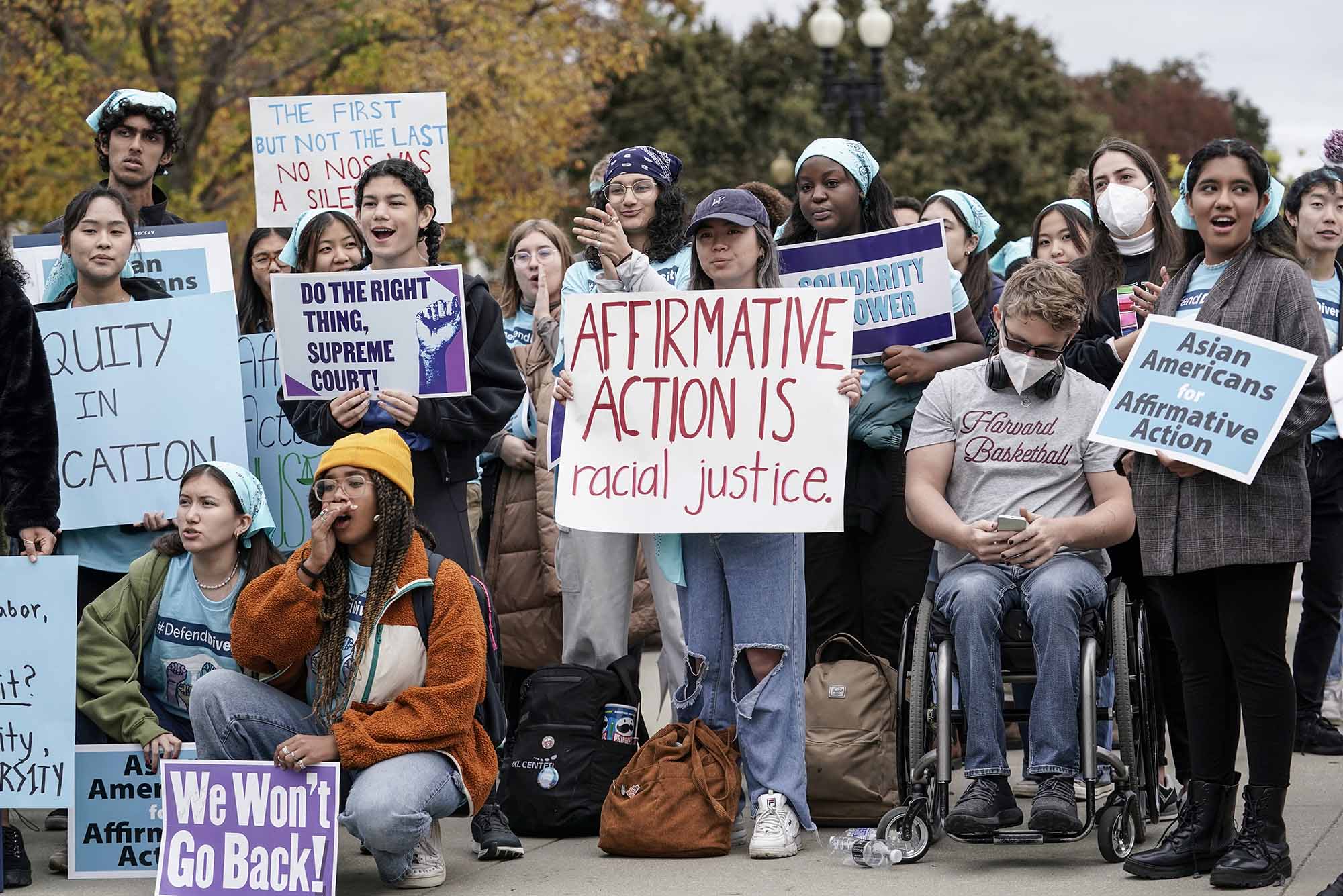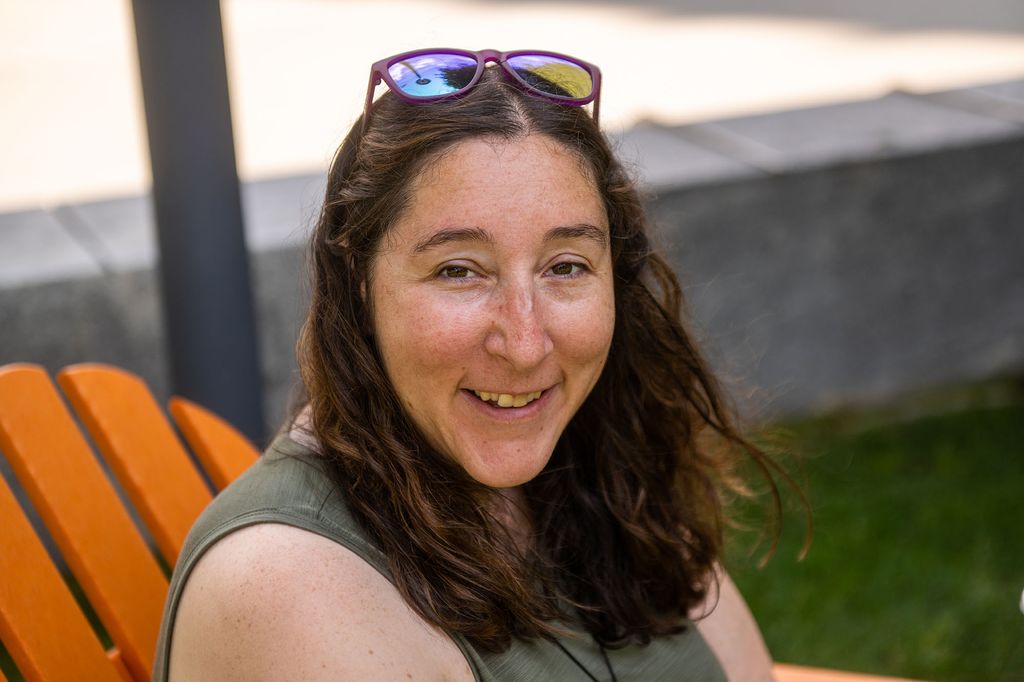Disappointed and Determined, BU Community Reacts to SCOTUS Affirmative Action Ruling
Officials vow to remain committed to building a diverse student body, with no intention of “rolling back the clock” to a time when DEI issues did not matter

A Supreme Court ruling on Thursday bans colleges and universities from factoring race into decisions about admissions. File photo by J. Scott Applewhite via AP
Disappointed and Determined, BU Community Reacts to SCOTUS Affirmative Action Ruling
Officials vow to remain committed to building a diverse student body, with no intention of “rolling back the clock” to a time when DEI issues did not matter
Editor’s note: This story will be updated with additional campus reaction. To read full statements from BU officials, including President Robert A. Brown, scroll to the bottom.
As was expected, the conservative-leaning US Supreme Court issued a ruling on Thursday that could ban the ability of colleges and universities to use race as a factor in weighing whether to admit a student. The court ruled that admissions programs at Harvard University and the University of North Carolina both relied, in part, on considering race as a factor in admitting students, an action that the court said violates the Constitution’s guarantee for equal protection.
The decision was 6-3, with Justice Ketanji Brown Jackson recusing herself from the decision in the Harvard case, because she had served on Harvard’s board of overseers. Chief Justice John G. Roberts wrote the opinion for the majority conservative members: “The student must be treated based on his or her experiences as an individual—not on the basis of race,” Roberts wrote. “Many universities have for too long done just the opposite. And in doing so, they have concluded, wrongly, that the touchstone of an individual’s identity is not challenges bested, skills built, or lessons learned but the color of their skin. Our constitutional history does not tolerate that choice.”
In a swift reaction, Boston University President Robert A. Brown wrote in a letter to the BU community Thursday afternoon: “The ruling of the Supreme Court of the United States (SCOTUS)—in cases addressing the admissions practices at Harvard University and the University of North Carolina—is profoundly disappointing because it takes us backward, potentially creating less diverse college campuses and a less just America. This decision is antithetical to Boston University’s values and mission.” (Brown’s full statement can be read below.)
Brown also joined a statement from the administration of Massachusetts Governor Maura Healey that said in part: “Massachusetts will always be welcoming and inclusive of students of color and students historically underrepresented in higher education. Today’s Supreme Court decision overturns decades of settled law. In the Commonwealth, our values and our commitment to progress and continued representation in education remain unshakable.”
Fierce debate led up to the decision on race-conscious admissions. Supporters of the issue argued that eliminating race as a factor in admissions would set the country back generations, after years of progress in lifting up underrepresented populations in higher education. Opponents have countered that using race as a determining factor in admissions is not only unconstitutional, but is no longer necessary because they believe society has progressed to a point where people are treated equally. Polling on the issue has generally found more Americans prefer that race or gender should not be included in determining admissions.
Setting the debate aside, the ruling is expected to have a seismic impact on colleges and universities. Experts say it will make it harder for colleges to have diverse classes and programs and to award grants and scholarships to a widely diverse collection of students.
In a statement from the Association of American Universities (BU is one of its 71 members), AAU President Barbara Snyder said: “AAU institutions will comply with the law as we recognize that equity and excellence are inseparable. We will continue to fulfill our educational and research missions, which require us to acknowledge the importance of diversity throughout the academic enterprise—and especially in student and faculty recruitment and retention.”
Reaction to the decision came from all corners of BU, from students all the way up to Brown, including Kelly Walter, dean of admissions, Sandro Galea, dean of the School of Public Health, Angela Onwuachi-Willig, dean of the School of Law, and others.
Here is a sampling of some campus-wide reactions:

Betsy Walters (GRS’25)
I think it was Justice Jackson who mentioned in her dissents, “Let them eat cake” obliviousness. I think that kind of summarizes how I feel about the decision. And I’m glad that she articulated it. I don’t want to claim expertise on the subject, but this doesn’t seem to affect legacy admissions, which heavily benefit a lot of white students. So I think race is embedded in ways that it’s very disingenuous to suggest that it’s not already a factor. Colleges must make every effort to reach as many diverse students in as many ways as possible.
Photo by Cydney Scott
Iffah Liyakath (CAS’26)
I am Muslim, so I am a minority and a person of color. When I applied to college, people were saying to me, ‘If you’re accepted, it’s because your race had an effect.’ And that was kind of annoying, because there is so much more to students than the color of their skin. But it’s also an important factor, because the reason [admissions departments] keep track of demographic and diversity data, is because you don’t want an all homogeneous population.
I’m East Asian and I don’t want my race to be the only thing that defines me. And I don’t think a lot of POC people do because it’s [often] the defining factor. The first thing you learn when you’re younger is that you’re different because of the color of your skin. For admissions you should be judged on who you are as a person, and what you bring [to a school] in terms of academics.
Cosette Upender, high school student from Mountain View, Calif., attending BU’s Summer Challenge program
I think it’s pretty unfortunate for students of color coming from underprivileged areas, because they often don’t have as much access, support, and resources. Now with this decision, they will have even less support. I feel like [colleges] should be able to ask about race because if [they] are asking questions such as, ‘Are you a first generation student?’ it’s pretty similar. They can ask if you’re an immigrant, right? So hopefully they can [achieve] some sort of diversity with that.
Comments & Discussion
Boston University moderates comments to facilitate an informed, substantive, civil conversation. Abusive, profane, self-promotional, misleading, incoherent or off-topic comments will be rejected. Moderators are staffed during regular business hours (EST) and can only accept comments written in English. Statistics or facts must include a citation or a link to the citation.